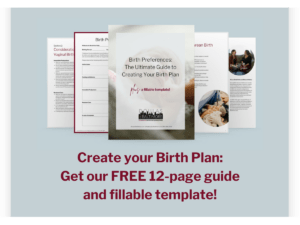At the very beginning of our Complete Childbirth Education classes in Baltimore, we ask you to fill in sentences about how you feel about birth. While “I am nervous about…” is definitely not the same for everyone, over the last year, COVID-19 has made expecting parents nervous. And it brings up lots of questions for new moms: What does coronavirus mean for a hospital stay? Could baby meet grandma and grandpa? Who will be able to help me after delivery?
Although 2020 was totally unexpected, at Doulas of Baltimore, we’ve tried to keep the safe, nurturing, and smart perspective we’ve had serving you for the last 7 years. As things are slowly getting back to normal, we wanted to share how 4 lessons from our CBE classes helped us get through this past year.
Need to Make a Decision? Use Your B.R.A.I.N.!
Use your B.R.A.I.N is a philosophy we use in class. When making a decision, think about benefits, risks, alternatives, intuition, and what would happen if you did nothing. At the very beginning of the pandemic, we used this philosophy to think about what services we could safely offer to you all. While we’ve always known the benefits of comprehensive support, there were many risks involved in continuing in-person classes and doula support. Our intuition (and clients and friends who work in medicine) helped us make the call to move all of our support to an alternative – virtual classes and support – until it was safe to be in person again.
Confidence and Support Help Get Us Through
Doulas are experts who provide steadfast and nonjudgemental support to you and your family during pregnancy, labor, and after baby arrives. While our classes continued with all of the regular topics, we also dealt with the most pressing issue: navigating the obstacles of COVID. What is the absolute need-to-know information? How can we help make this a less stressful situation in a very stressful climate? Like in all of our classes, we focused on evidence-based information and provided straight talk about birth and postpartum care in the pandemic. We also used that same evidence-based information to make decisions about how to run our business and what we could safely offer to clients.
Take a Deep Breath
Was that a contraction? A real contraction? Or just pre-labor? In our classes, we always go over the stages of labor and how to tell the difference. Over this past year, each time a wave of infections started coming down and businesses started opening up, it was almost like Braxton Hicks contractions. They are stressful, because you are trying to figure out if they are real or not, but ultimately, they are not the real thing.
When we went virtual, we wanted to wait until it was safe and realistic to provide in person support again, and we wanted to know the difference between pre-labor and real labor. The last thing we wanted to do was tell a client, “Yes, we can be with you in the hospital,” and then back out. Now, as vaccinations are available for everyone, case numbers remain low, and hospitals have permanently re-opened for professional doula support, we can offer in-person support again.
Adapting is Key
If you’ve been in one of our classes or been pregnant, you know: labor takes many paths. And what you want to do is know the unexpected situations and what to do about them. No one knew what 2020 would bring us or when, and adapting to the ever-changing scenarios has become key to keeping our support going. We were able to bring classes to a virtual space, and some aspects of online meeting and learning are great (including no commutes on weeknights!). This is one reason we plan to continue to offer some classes online in the future. However, some things such as comfort measures, are hard to teach over Zoom. And, a big part of what we do is supporting you during and after birth, in person. So, we are adapting again. This fall, we will be offering a few classes in person in addition to our online Complete Childbirth Education class, and we have begun working one-on-one with families in person again for both birth doula support and in-home postpartum and newborn care
You can find out more about our classes here and contact us to find out more about in person doula support this summer and fall.


